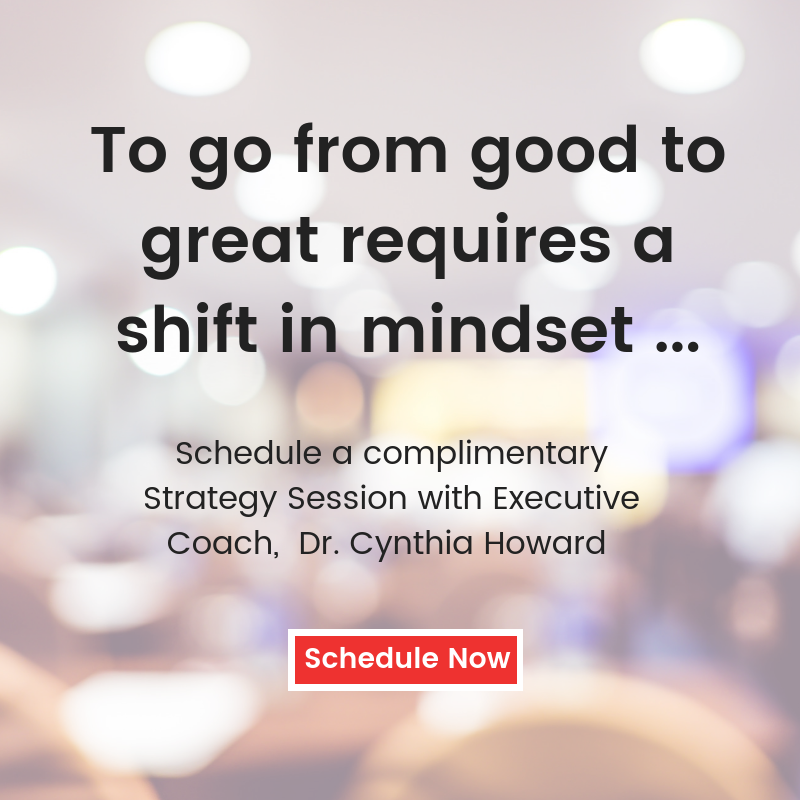
7 Leaders Blind Spots (Where are you?)
Assumptions and bias are part of human nature. We are hard-wired to reject what doesn’t fit into our mental models, unless; we develop self-awareness and the ability to reflect.
During my 20 year practice as an Executive Coach, I have met with scores of leaders and professionals who were stuck, compromising decisions and outcomes. I developed a model for resilient thinking to help leaders learn to question and clarify to stay open to potential.
First, identify your blind spots! There are different types of bias that skews perspective and limits a leader’s ability to achieve. Check out the most common blind spots that short circuit your effectiveness.
Have you said the following:
- I am not here to make friends.
This statement mischaracterizes the relationships leaders need with their team. It through relationships you will achieve your desired results. Know your strengths. If your naturally focus more on results (and are not inclined to develop relationships) put into place opportunities for your team to connect, like a working lunch.
- I do not need to praise my people; they know how I feel.
Yes, your people understand you are not there to “make them feel good,” however; we all have a basic need for recognition. When your boss acknowledges your work, it fuels motivation. To manage your momentum, fuel your team with appreciation and let them know what they do that contributes to the success in the department.
- I am in control.
This is big. As the leader it is important to “control” the processes, using the scorecard and continuous improvement measures to ensure you achieve your desired outcomes. It is not wise to control your people. They will rebel and resist. You want to engage and motivate them.
- I do not have the time.
Yes, time seems in short supply. Is this due to distractions, lack of clarity around what is most important, putting out other people’s fires? Without focus, there will never be enough time.
- I know what to do (or what is best).
Yes, from your perspective, your experience paves the way for a unique viewpoint. Yet, the higher up the hierarchy you go, the less detail you have about what is happening in the organization. From the front line, all the way up through managers and supervisors, ideas, suggestions, nuance is filtered by this bias. Make it a practice to ask questions, choose individuals for teams that have experience and competency in the area you need.
- I will wait and see (maybe if I ignore it, it will go away.)
I understand the need to “pick your battles,” to save time and energy. This blind spot cause one to miss opportunities to resolve issues because of the fear of confrontation. Not making those tough decisions creates other problems. There is a cost to waiting.
- Emotions make you look weak. Leave them at home.
Emotions are part of the survival mechanism, hard wired into our nervous system. We cannot ignore them or avoid them without risk of being hijacked later. Emotional effectiveness differentiates good leaders from great leaders.
Science shows that the brain's emotional center is right next to the decision-making center and when damaged the ability to make even the simplest of decisions is impaired. Emotions carry important information about what is happening in the environment. As you increase your emotional awareness, you increase your situational awareness.
To motivate and inspire your team, appeal to their emotions.
Develop your emotional intelligence to have greater influence. The most effective leaders make the time to reflect on their interactions, learn from their experiences and grow. This is how you develop leadership skills. Self-awareness is the number one characteristic that will increase your effectiveness.
What blind spot stood out to you? Did you resist any? Get real, and find out what you are missing in your peripheral vision.
Did you know coaching is the single greatest accelerator of change? Coaching will move your effectiveness ahead faster than anything.
About the Author Cynthia Howard RN, CNC, PhD
Performance Consultant. Unleashing potential in leaders and organizations through innovative performance development.
Check these out
- Sites Not Registered With Gamstop
- Siti Non Aams
- Siti Non Aams
- Casino Non Aams
- Casino Not On Gamstop
- Gambling Sites Not On Gamstop
- Gambling Sites Not On Gamstop
- Migliori Siti Non Aams
- Gambling Sites Not On Gamstop
- Casinos Online
- Casino Sites UK
- Non Gamstop Casinos UK
- Gambling Sites Not On Gamstop
- Non Gamstop Casino Sites UK
- Casinos Not Signed Up To Gamstop
- Non Aams Casino
- Best Casino Sites UK
- Non Gamstop Casinos UK
- Sites Not On Gamstop
- Casino En Ligne Meilleur Site
- Non Gamstop Casinos
- Betting Sites UK
- New Non Gamstop Casinos No Deposit Bonus
- Casino Non Aams Italia
- Casino Online Migliori
- Migliori Casino Online
- Sites De Paris Sportifs Belgique
- オンラインカジノ本人確認不要
- Scommesse Crypto
- Casino Online Non Aams
- 카지노 사이트 추천
- Casino En Ligne
- Casino En Ligne Fiable
- I Migliori Casino Non Aams
- オンラインカジノ
- Meilleur Site De Casino En Ligne
- Casino En Ligne France
- Casino Con Crypto
- Nuovi Siti Scommesse Non Aams
- Top Casino En Ligne

